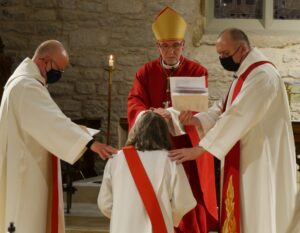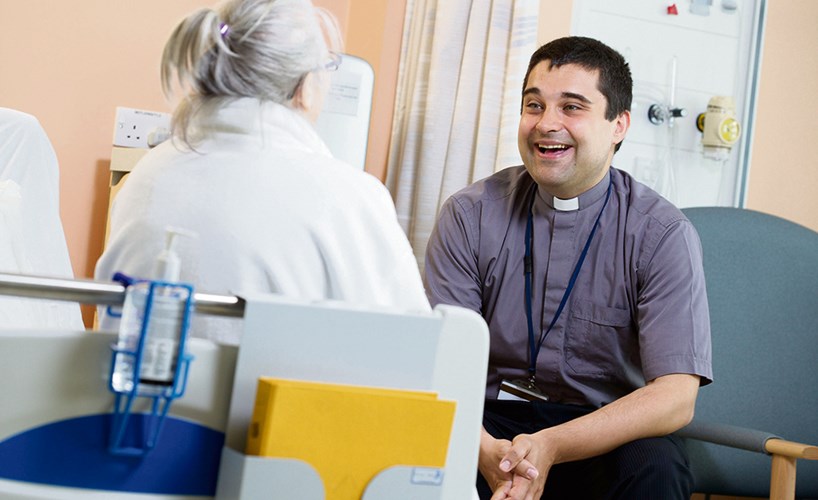A reflective post from Norma Higgott, a deacon in the Scottish Episcopal Church, on what it means to her to be a deacon hospice chaplain.
Diaconal Ministry
NORMA HIGGOTT
United Diocese of Mory, Ross and Caithness
Diakonía is more than humble service; it signifies the undertaking of a task or mandate commissioned by another, of ‘being sent forth to fulfil a task on behalf of the one who has the authority to send’.(1)Deacons are people ‘on a mission, a messenger or ambassador —making connections between liturgy and pastoral need, building bridges between the life of the Church and those who are not yet within it’.(2)
Two descriptions of what the role of a deacon is —the first talking of them being sent, commissioned by God and by their bishop to the work they are called to; and the second talking of the in-between place where deacons often find themselves when they are working in the world, and yet trying to incorporate that world into the life of the Church. The hymn, ‘I the Lord of Sea and Sky’, which was sung at my ordination, speaks in the chorus about listening to God’s call:
Here I am, Lord, Is it I, Lord?I have heard you calling in the night.I will go, Lord, if you lead me.I will hold your people in my heart.
I chose it because, for years, those words had haunted me as I sought to discover how I could best serve the God who seemed to keep calling me. I felt called but I truly didn’t know what to — eventually, with the change of the church’s focus on the diaconate, and following much discussion as part of the Diaconate Working Group, I began to feel that this was perhaps what God was calling me to.
However, it was never going to be an easy calling; firstly, because it was so rarely recognized at that time as a true and necessary part of the Church’s ministry, and secondly, because being called to the diaconate meant being called to a ministry that was challenging, exciting and often unexpected. It is a ministry which is often misunderstood and underestimated, and one which requires people who are secure in their faith and calling, and willing to say, ‘Here am I Lord, send me.’

From the Scottish Episcopal Church: ordination of deacon
Following my ordination, I then had to discover where it was that God was calling me to serve his people, and quite by chance he handed me an opportunity which I have found fulfils my vocation and ministry, serving as a chaplain to the Highland Hospice. There God has called me to walk, as his Son did, alongside the sick, the troubled and the anxious, as they face their journey with cancer. There God challenges me to be his face to many folk who have lost their faith in him, to many who are struggling with their faith, to those who are not sure about faith but want to believe in eternal life, and to those who have no faith but need spiritual care to ease their path to death. God asks us to let his light shine, to show his love and compassion to all those we meet, and to be his Church in the world. Deacons are sent by God and by their bishop to serve as a prophetic voice, to be heralds of God’s kingdom, but there is no ‘one size fits all’ way of doing that, and we must all learn what is needed in our own situations so that we can just BE alongside God’s people.
Deacons are often called the servants of the Church. In the Old Testament, the word for servant (particularly used by Isaiah) is the one sent to live out God’s mission in the world and bring light to the nations. The Ordinal draws out this prophetic dimension to the deacon’s ministry:
They are to proclaim the gospel in word and deed, as agents of God’s purposes of love[…] searching out the poor and weak, the sick and lonely and those who are oppressed and powerless, reaching into the forgotten corners of the world, that the love of God may be made visible.
Chaplains are particularly called to be that agent of God’s purpose, walking alongside the poor, the weak, the sick, the lonely, the despairing and the bereft, to make the love of God visible to them. As a chaplain I am committed to being God’s loving face in the hospice, to ensure the spiritual wellbeing of those I encounter. I am there to love and care for people, patients, family and fellow staff members, through the good times and the bad, with love and compassion, helping them to make connections between life and faith.
My diaconal role takes place mostly outside the normal life of a congregation. I am there to live out the prophetic role of a deacon, to build bridges between what happens in church and what happens in the world, offering God’s love and compassion, and sharing and representing Christian values and beliefs. My ministry allows me to discover what is happening out there beyond the Church, with sensitivity and respect for the beliefs and values of all those I encounter. We are called to build bridges with those of all faiths and none, encouraging them to discover that spiritual wellbeing which will help them to value their life, and to discover what is important to them, what it is that makes their life complete and whole. We encourage them to look at faith and what part it plays in that spiritual wellbeing. It is challenging and exciting work, reflecting part of the ministry of Jesus during his lifetime when he too ministered outside the walls of the Temple and largely outside the gathered communities of faith. This diaconal ministry is about living out the Gospel in word and deed, making Jesus’s ministry as real as possible in today’s world with empathy and understanding, and without using religious terminology in a world that so rarely understands it or welcomes it.
My ministry is incredibly varied; no two visits are the same. When asked, I can’t really describe what it is I do as a deacon, other than that it means meeting people where they are on their journeys, listening to them, encouraging them in their questioning about life and death, and enabling, supporting and being alongside them as their journeys come to an end. It also involves leading worship, facilitating groups, and working alongside many others collaboratively. My role may involve being with people on a one-to-one basis but also engaging with families.

image from churchtimes.co.uk
Diaconal ministry also means that I have an opportunity to bring the world into the Church, to share what is happening, to encourage prayer for those outside the Church, and to help church members to explore some dreams and visions for their own community involvement. Deacons can help local church members to explore their own gifts by sharing their gift of being available, of being present and of sharing their call. Deacons can help local folk to understand some of the issues people are dealing with in their lives, and encourage them to deal with some of the difficult questions and experiences of life and death.
Pastoral care is one of the most fulfilling parts of my vocation and ministry as a deacon. Being alongside folk in the hospice, at times of bereavement, in times of joy and sorrow, sharing in conversations and in prayer, is a very great privilege; but it also comes with great responsibility. We are perhaps the only face of God they have ever met and got to know personally, and so it falls to us to ensure that we are the very best, most loving and compassionate, prayerful face; one that will truly show we are sent by God as his emissaries in the world, to bring his love and compassion to all.
It is my vocation and ministry as a deacon to be a presence without trying to ‘do’ anything, and thereby to allow God’s agenda to happen, for we are ordained to be God’s servants, following the path set out for us by Christ, the true servant, not a human one. We are commissioned to be the agents of God’s purpose of love in this world, which does not mean that we have to do anything other than be there for all those we meet, sharing love, compassion and care. This means listening carefully and being alert to all kinds of possibilities — finding the kingdom right under one’s nose (the treasure in the field), for often even when we aren’t looking for Jesus or expecting to find him, we stumble across him in unexpected places and people. Often just being alongside people and giving them space to talk can provide amazing insights into how God works in this world, to bring the kingdom into people’s lives and to bring light to the nations. If, as Isaiah tells us, we are to live out God’s mission in the world and to bring light to the nations, then we need to BE alongside people to recognize and encourage that light to shine, even when it is hidden from the eyes of the world. It is a privilege and a joy to have this opportunity just to BE.
Being commissioned by God to carry out his work in the world calls us to listen to what it is we are being asked to be, and then to be his voice and his body in the world, to be prophets in a world that doesn’t understand the term, and to be bridge builders, to enable those we encounter in our liturgical role to better understand the needs of the world of which we are all a part. The vocation of the deacon is not solely in the world; it must also be within the wider Church, sharing the work of ministry alongside their bishop, and thereby enabling the Church to support and pray for the work which is happening outside in the world.
As the Ordinal says, ‘to fulfil such a task is not in human power but depends upon the grace of God’.
References: 1. Paul Avis, A Ministry Shaped by Mission (London: T & T Clark, 2005), p. 106.
2. ‘Discerning the Diaconate’, Ministry Division of the Church of England (2011)
Find more fascinating articles about the diaconate in the Scottish Episcopal Institute Journal, Winter 2020 Volume 4.4
